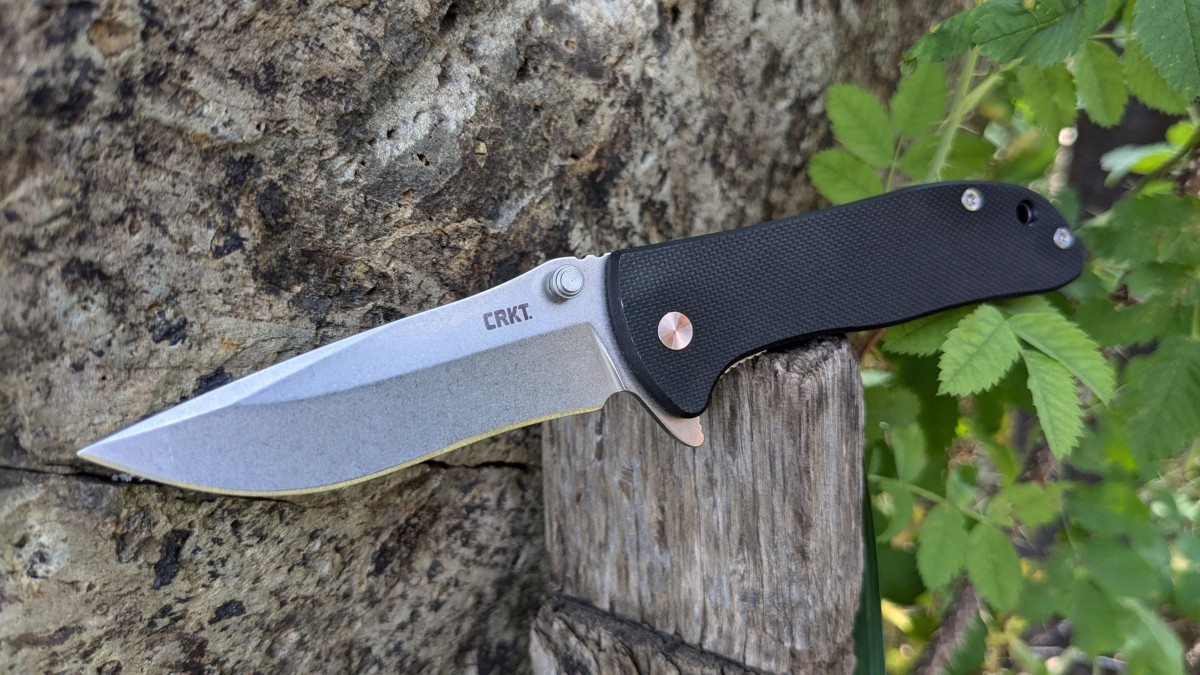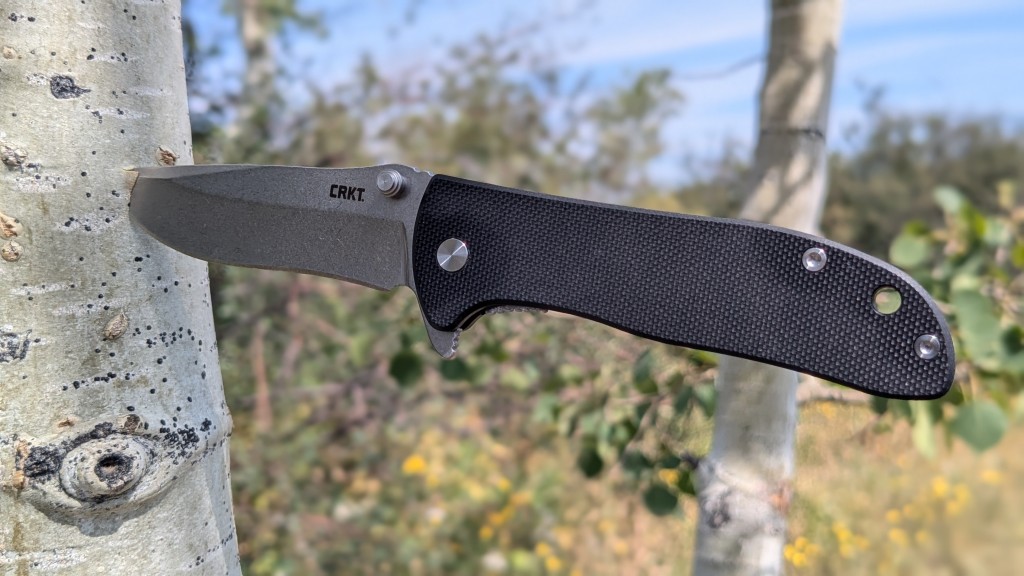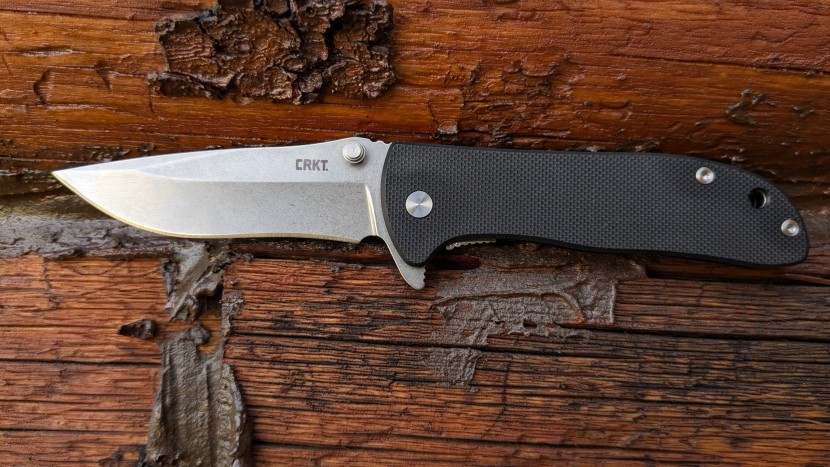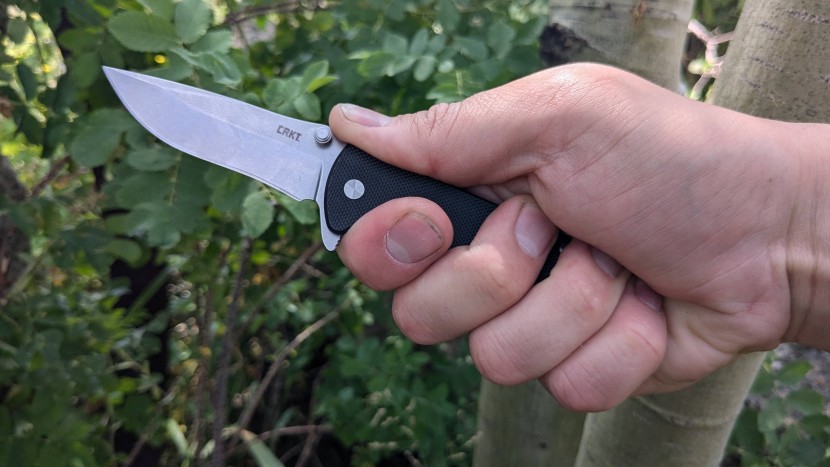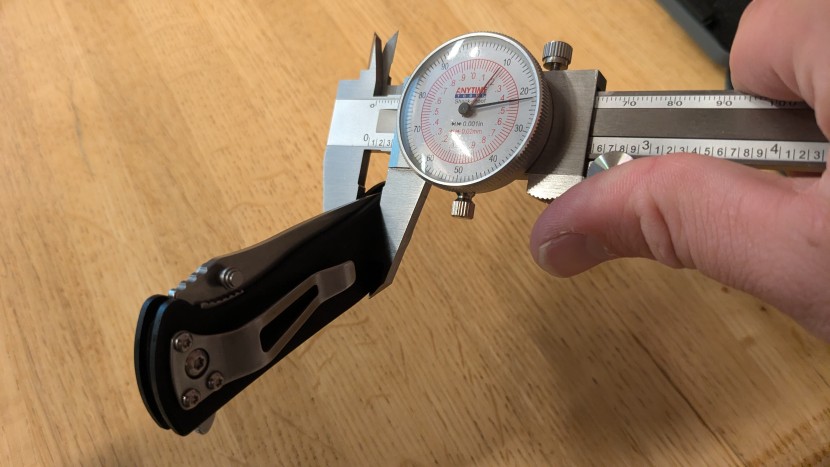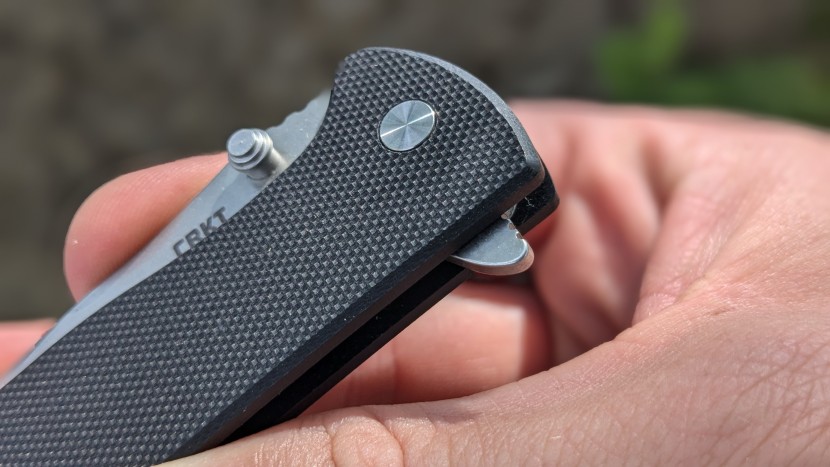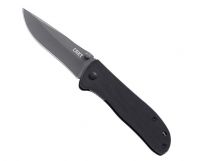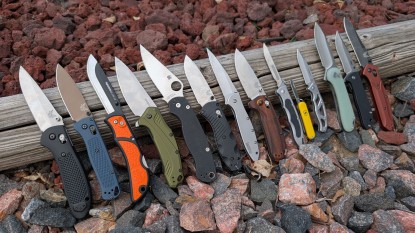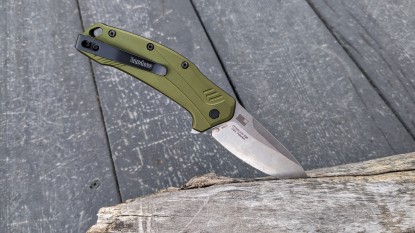Users looking for an entry-level pocket knife that delivers some good performance and respectable features, look no further.
Editor's Note: After retesting this award-winning product, we updated our review on October 26, 2024, to ensure all our findings on the newer model are accurately reflected and to ensure alternate product suggestions align accurately.
Our Verdict
Our Analysis and Test Results
CRKT originally marketed the Drifter as a “good logo knife,” meaning it was designed to be a pretty basic knife for promotional giveaways, optimized for imprinting and engraving. That rhetoric is no longer found on their site, and our guess as to why is that they realized they had an unexpected hit on their hands. The Drifter has some surprisingly great features for its affordability.
Blade and Edge Integrity
CRKT blades are generally well-regarded. Our most recently tested model features D2 Stainless Steel, but the Drifter is offered in several blade steel and handle combinations. D2 is one of the earlier knife-specific alloys developed, but it is still one of the best budget knife steels commonly used. We see it put to work on knives double or triple the cost. It has excellent edge retention due to the high levels of carbides formed while casting, making it especially receptive to hardening techniques. The trade-off is the toughness suffers a bit, meaning the steel is fairly brittle and may be more prone to chips and nicks over time. Compared to the 8Cr14MoV alloy used in one of the other versions offered, which has more chromium, 8Cr14MoV is more corrosion-resistant than D2 but not as hard. For a deep dive into steels, we recommend reading up on one of our favorite resources, Knife Steel Nerds.
The blade shape is also worth looking into further on the Drifter. A slight drop point with a swedge cutout along the spine is pretty standard stuff. But the recurved edge is more exotic for a budget knife like this, and we love it. A recurve blade means that the belly of the blade is slightly concave, which helps in a couple of subtle but important ways. It effectively makes the blade length longer than it measures from handle to tip, and every bit counts on a small knife like this. The other big benefit is it helps keep the edge in place while cutting and slicing, delicately 'locking' the blade onto a curved subject like a tree branch while cutting along its length. Recurve blades are perhaps most commonly used in hunting knives, especially effective for skinning. The trade-off here, though, is that the mid-edge curve can make it tougher to sharpen for an inexperienced user. Understand this, adapt, and you shouldn't have a major problem.
Ergonomics
There are no two ways about it; the Drifter is a compact pocket knife. A usable handle length of about 3.25 inches won't quite fill most adult fists. The pinky on all hands we tested tends to sit about 1/2 way off the end, for example. On a positive note, though, the forefinger sits in a very prominent nook against the front quillion (i.e., the front guard), which gives some serious protection. That quillion also doubles as the flipper used to open the knife, so it has some aggressive ribs cut into it. That's helpful to get a grip for opening, but it can be a pain pushing into the skin with prolonged use.
The handle material is G10, a fiberglass laminate also common in the industry, which gives a good grip in a strong but light package. The liner lock is also the standard for most budget pocket knives produced, but we like this example more than usual. Liner locks are often quite stiff and tough to release (not the case here), but they're also considered less 'safe' than other lock types because the blade necessarily closes on a finger when disengaged. But here, the finger will hit that prominent flipper/quillion feature before the sharp edge of the blade. A simple but smart design.
Better yet, though, is the opening action on the Drifter. The magnet retainer on the blade, when closed, is a little stronger than we prefer, but when broken, the blade swings open quickly and smoothly. Almost too easily, in our opinion — the blade seems to jump open even though it's a non-assisted knife (i.e., no spring mechanism to help propel the blade open). The flipper is really the only way we recommend opening the knife, though. There are ambidextrous thumb studs on either side of the blade, but we find they're too close to the handle, putting the thumb in an awkward position and making it tough to get proper leverage.
Portability
As mentioned, this model is small but intentionally designed to be so. At 3.65 inches long and 2.2 ounces in weight, the Drifter is quite compact on the road and is meant to serve as a wonderful EDC (everyday carry) option. But you'll probably not want to use it for high-pressure or lengthy cutting tasks.
There are some disappointing notes to mention here as well. The pocket clip is very stiff, and we believe it would noticeably cut up the edge of a pocket over time, even with tougher fabrics like denim. The clip is fixed and optimized for only right-pocket, tip-down carry. Many knives have a clip that can be swapped sides to accommodate lefties or even swap ends. A tip-down orientation is usually justified as the 'safer' way since the tip can't catch on the pocket edge when pulling out of a pocket. But it also means the knife has to be turned 180° in the hand before opening. Tip-up is the way to go for fast deployment.
The thumb studs are also especially prominent on this knife, sticking out past the width of the handles themselves. In the pocket, these studs could tend to rub a hole through the fabric on either side. We should mention that, with the thumb studs and pocket clip removed, this would make an excellent 5th pocket carry.
Construction Quality
Again, for a budget knife, we're pretty pleased with the construction quality of the Drifter. The materials used in any of the configurations aren't anything to write home about, but they're also found on more expensive models, making them tried and true.
The IKBS ball-bearing pivot is smooth, reliable, and easy. The liner lock fully engages on the blade and is easy to disengage when ready to store. The blade sits pretty perfectly centered in the handle when closed and has about 1mm of clearance on either side afterward.
Being a thinner, smaller knife though, it's not rock solid. You can coax some bend out of the pivot if you try. So, this isn't a knife we recommend for heavy-duty tasks. You may be disappointed with the blade broken clean from the handle if you pry or twist too hard in some stubborn material.
Should You Buy the CRKT Drifter?
We found ourselves very pleasantly surprised by the Drifter. It's not the big bad wolf of the knife world, but for an EDC knife, you're going to find a ton of value with this product. Buy it if you're looking for some respectable steel and a recurve blade in a compact frame.
What Other Pocket Knives Should You Consider?
There's a huge world of pocket knives out there, and there's a lot of value to be found at higher price points if you're open to that. Benchmade makes some beautiful compact knives that fit more fully in hand, like the Mini Barrage or North Fork. The Kershaw Leek is one of our favorite EDC knives available. Or, if you're interested in going even smaller, check out the Gerber Paraframe Mini. For value, though, the option we think competes most directly with the Drifter is the CIVIVI Button Lock Elementum II
| Awards | Best on a Tight Budget |
|---|---|
| Price | $50 List Check Price at Amazon |
Overall Score  |
|
| Star Rating | |
| Bottom Line | A solid, everyday carry knife that outperforms its price tag |
| Pros | Prominent flipper/finger guard, recurve blade, portable |
| Cons | Tip-down orientation, stiff pocket clip, small in the hand |
| Rating Categories | CRKT Drifter |
| Blade and Edge Integrity (30%) | |
| Ergonomics (25%) | |
| Portability (20%) | |
| Construction Quality (25%) | |
| Specifications | CRKT Drifter |
| Blade Style | Recurve blade, plain edge |
| Blade Length | 2.75 in |
| Blade Material | D2 stainless steel |
| Weight | 2.20 oz |
| Length Closed | 3.65 in |
| Length Open | 6.49 in |
| Closed Thickness w/o Pocket Clip (Measured) | 0.33 in |
| Blade Thickness | 2.31 mm |
| Closed Blade Lock | No |
| Open Blade Lock Mechanism | Liner lock |
| Handle Material | G10 fiberglass laminate |
| Opening Style | Flipper (non-assisted), ambidextrous thumb stud |
| Carry Style | Pocket clip, lanyard hole |
| Other Features Or Functions | Lanyard hole |


